Design decisions for buildings and communities are critical to efforts to increase local and regional resiliency. Building designers — of residential, institutional, and commercial structures — should strive to incorporate passive and active survivability concepts into new and renovated structures.
Community planners and developers need to incorporate concepts that increase the capacity to maintain transportation flow, strategies to handle water management, and infrastructure approaches that will withstand a variety of risks.
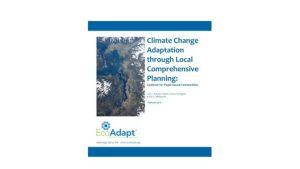
Adaptation Through Local Comprehensive Planning: Guidance for Puget Sound Communities
This extensive guidance document was developed as a result of a vulnerability assessment and local comprehensive plan update process undertaken by the City of Bainbridge Island, which worked with the climate consulting firm EcoAdapt.
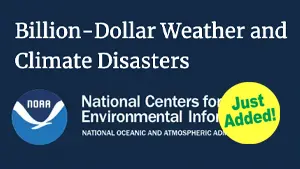
Billion-Dollar Weather and Climate Disasters
The National Centers for Environmental Information’s (NCEI) Billion-Dollar Disasters product is intended to show the impact of extreme weather and climate events on the economy in inflation-adjusted dollars.
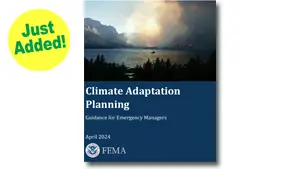
Climate Adaptation Planning: Guidance for Emergency Managers
FEMA’s Climate Adaption Planning: Guidance for Emergency Managers is intended to help state, local, tribal, and territorial (SLTT) emergency managers incorporate climate adaptation into emergency management planning efforts.
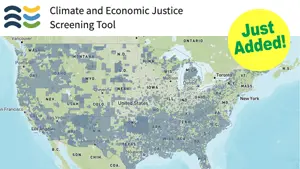
Climate and Economic Justice Screening Tool
The Climate and Economic Justice Screening Tool from the Council on Environmental Quality features an interactive map and uses datasets that are indicators of burdens in eight categories: climate change, energy, health, housing, legacy pollution, transportation, water and wastewater, and workforce development.
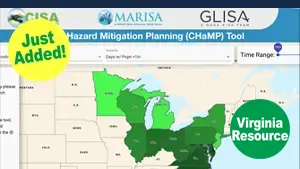
Climate and Hazard Mitigation Planning (CHaMP) Tool
CHaMP provides users with a single point of access to county-, state- and region-specific historical climate and hazard data and projected climate information.
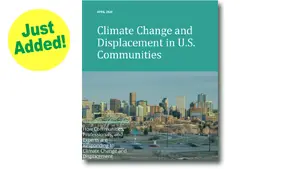
Climate Change and Displacement in U.S. Communities
EcoAdapt conducted a survey with the Strong, Prosperous, and Resilient Communities Challenge to determine if and how people working to address displacement pressures are considering the effects of climate change. This survey is part of a broader project in collaboration with the Urban Displacement Project to better understand the intersections between climate change and displacement pressures.
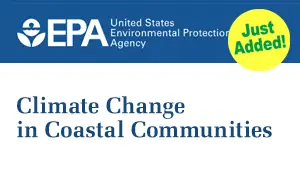
Climate Change in Coastal Communities
US EPA maintains a website that focuses on essential information for coastal communities planning for the effects of climate change.
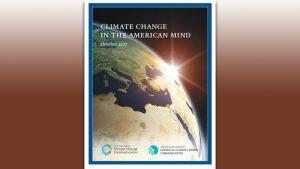
Climate Change in the American Mind
The latest survey from George Mason University’s Center for Climate Communication reveals that the number of Americans “very worried” about global warming has reached a record high since first measured in 2008.
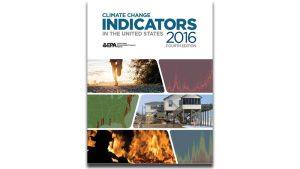
Climate Change Indicators in the United States
This 2016 report from the U.S. Environmental Protection Agency (EPA) shows compelling and clear evidence of long-term changes to our climate and highlights impacts on human health and the environment in the United States and around the world.
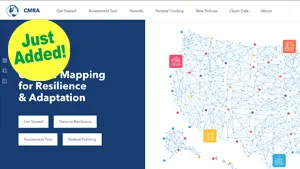
Climate Mapping for Resilience and Adaptation
The U.S. Climate Resilience Toolkit offers a framework to help communities systematically consider and address their climate hazards.

Adaptation Through Local Comprehensive Planning: Guidance for Puget Sound Communities
This extensive guidance document was developed as a result of a vulnerability assessment and local comprehensive plan update process undertaken by the City of Bainbridge Island, which worked with the climate consulting firm EcoAdapt.

Billion-Dollar Weather and Climate Disasters
The National Centers for Environmental Information’s (NCEI) Billion-Dollar Disasters product is intended to show the impact of extreme weather and climate events on the economy in inflation-adjusted dollars.

Climate Adaptation Planning: Guidance for Emergency Managers
FEMA’s Climate Adaption Planning: Guidance for Emergency Managers is intended to help state, local, tribal, and territorial (SLTT) emergency managers incorporate climate adaptation into emergency management planning efforts.

Climate and Economic Justice Screening Tool
The Climate and Economic Justice Screening Tool from the Council on Environmental Quality features an interactive map and uses datasets that are indicators of burdens in eight categories: climate change, energy, health, housing, legacy pollution, transportation, water and wastewater, and workforce development.

Climate and Hazard Mitigation Planning (CHaMP) Tool
CHaMP provides users with a single point of access to county-, state- and region-specific historical climate and hazard data and projected climate information.

Climate Change and Displacement in U.S. Communities
EcoAdapt conducted a survey with the Strong, Prosperous, and Resilient Communities Challenge to determine if and how people working to address displacement pressures are considering the effects of climate change. This survey is part of a broader project in collaboration with the Urban Displacement Project to better understand the intersections between climate change and displacement pressures.

Climate Change in Coastal Communities
US EPA maintains a website that focuses on essential information for coastal communities planning for the effects of climate change.

Climate Change in the American Mind
The latest survey from George Mason University’s Center for Climate Communication reveals that the number of Americans “very worried” about global warming has reached a record high since first measured in 2008.

Climate Change Indicators in the United States
This 2016 report from the U.S. Environmental Protection Agency (EPA) shows compelling and clear evidence of long-term changes to our climate and highlights impacts on human health and the environment in the United States and around the world.

Climate Mapping for Resilience and Adaptation
The U.S. Climate Resilience Toolkit offers a framework to help communities systematically consider and address their climate hazards.
